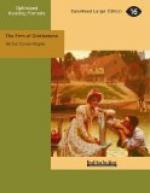He wrote again about a fortnight afterwards, and his letter, as it crossed the Atlantic, passed the outward mail, which bore the news of the wonderful diamond find made by an English geologist among the Ural Mountains.
“I am now on a tour among the camps,” he said. “I have worked right through from Hebron to Klipdrift, Pniel, Cawood’s Hope, Waldeck’s Plant, Neukirk’s Hope, Winterrush, and Bluejacket. To-morrow I push on to Delparte’s Hope and Larkin’s Flat. I am well received wherever I go, except by the dealers, who are mostly German Jews. They hear that I am a London capitalist, and fear that I may send up the prices. They little know! I bought stones all the way along, but not very valuable ones, for we must husband our resources.
“The process of mining is very simple. The men dig pits in loose gravel lying along the banks of the river, and it is in these pits that the diamonds are found. The black men, or ‘boys,’ as they call them, do all the work, and the ‘baas,’ or master, superintends. Everything that turns up belongs to the ‘baas,’ but the boys have a fixed rate of wages, which never varies, whether the work is paying or not. I was standing at Hebron watching one of the gangs working when the white chap gave a shout, and dived his hand into a heap of stuff he had just turned over, pulling out a dirty looking little lump about the size of a marble. At his shout all the other fellows from every claim within hearing gathered round, until there was quite a crowd.
“‘It’s a fine stone,’ said the man that turned it up.
“‘Fifty carats if it’s one,’ cried another, weighing it in the palm of his hand.
“I had my scales with me, so I offered to weigh it. It was sixty-four and a half carats. Then they washed it and examined it. There was a lot of whispering among them and then the one who had found it came forward.
“‘You deal, don’t you, Mr. Girdlestone?’ he said.
“‘Now and then,’ I answered, ’but I’m not very keen about it. I came out here more for pleasure than business.
“‘Well,’ he said, ’you may go far before you see a finer stone than this. What will you bid for it?’
“I looked at it. ‘It’s off-coloured,’ I said.
“‘It’s white,’ said he and one or two of his chums.
“‘Gentlemen,’ I said, ’it is not white. There are two shades of yellow in it. It is worth little or nothing.’
“‘Why, if it is yellow it makes it all the more valuable,’ said a big fellow with a black beard and corduroy trousers. ’A yellow stone’s as good as a white.’
“‘Yes,’ I answered, ’a pure yellow stone is. But this is neither one nor the other. It’s off-colour, and you know that as well as I.’
“‘Won’t you bid for it, then?’ said one of them.
“‘I’ll bid seventy pounds,’ I said, ‘but not a penny more.’
“You should have heard the howl they all set up. ’It’s worth five hundred,’ the fellow cried.




